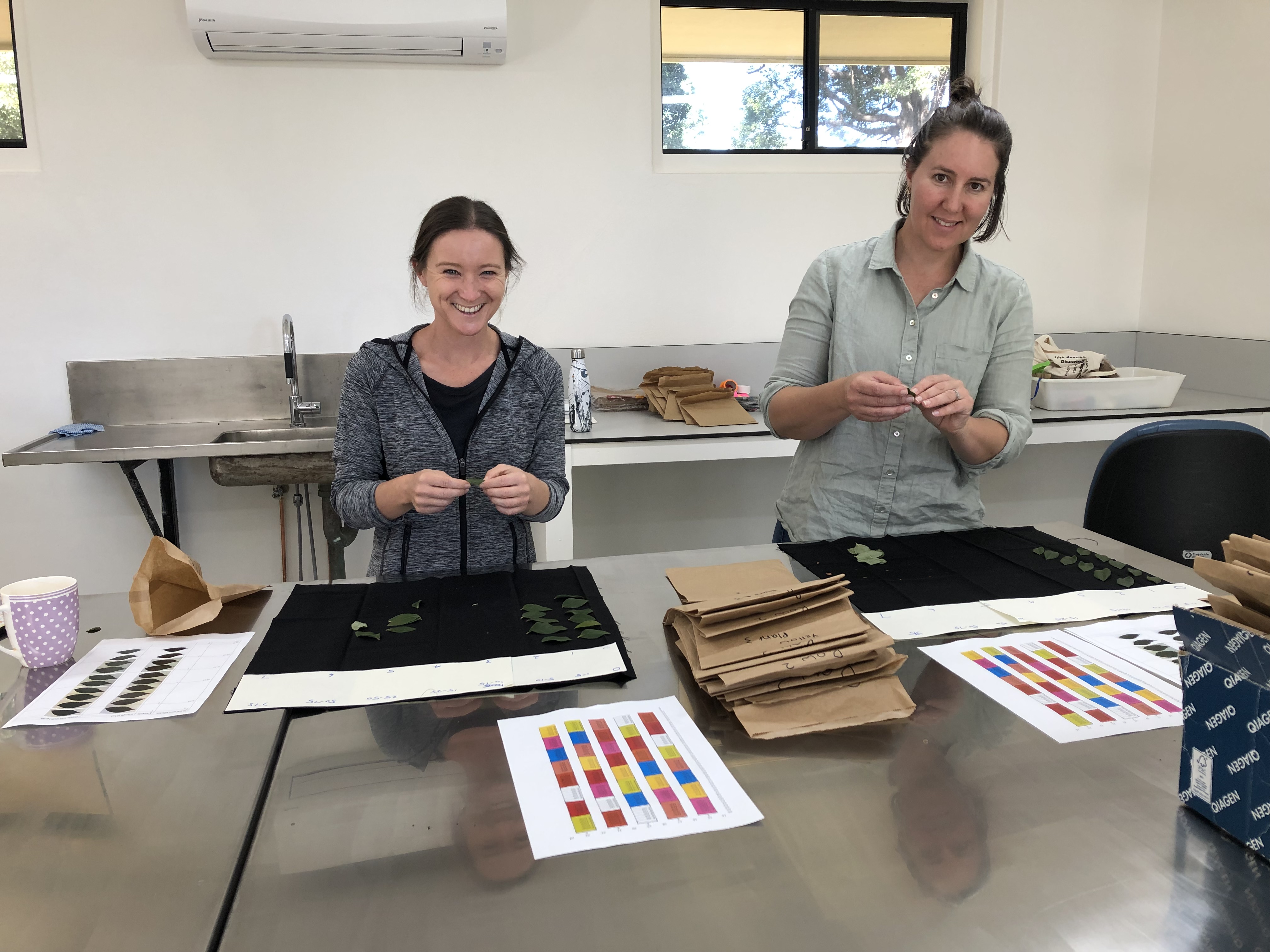Expanding crop protection for blueberry rust control on organic farms
Categories
Share
/prod01/channel_8/media/scu-dep/news/images/2021/Blueberry-rust-infected-blueberry--leaves-showing-yellow-rust-pustules-on-undersides-of-leaves-720X475.JPG)
Centre for Organics Research Plant Pathologist, Dr Jay Anderson has joined a team of experts from across the eastern states to expand the range of crop protectants available to organic blueberry growers for control of blueberry rust disease.
“Blueberry rust is a consistent threat for growers across New South Wales, Queensland and increasingly Victoria,” said Dr Anderson.
“The results of this project will benefit all blueberry growers, both conventional and organic.”
The incursion of the disease into Tasmania sparked the project led by the Tasmanian Institute of Agriculture (TIA).
“Blueberry rust can be severe when mild temperatures combine with wet and humid weather. Fruit from affected farms can only be moved under strict protocols to some interstate markets,” said TIA Horticulturist, Michele Buntain.
“Organic growers make up a significant number of Tasmanian blueberry producers and with the recent arrival of rust they are calling out for more options for control."
Blueberry rust is caused by the fungus Thekopsora minima. The disease affects plant leaves reducing photosynthetic area and causing leaf drop, loss of vigour and reduced yield. It can also affect fruit.
Nine crop protection products were screened in glasshouse trials conducted by Staphyt Pty Ltd to determine application rates and narrow the field. Promising candidates were tested during the 2021 growing season in a large-scale field trial in northern NSW where the threat from rust is a consistent factor for blueberry growers.
Melinda Simpson (left) of the NSW Dept of Primary Industries with Dr Jay Anderson of the Centre for Organics Research assess blueberry rust disase symptoms on blueberry leaves.
Field trials were conducted by Dr Anderson and Blueberry Development Officer Melinda Simpson from the NSW Department of Primary Industries, who performed disease assessments on more than 12,000 leaf samples from the field site.
First season results indicate that the current organic control, copper hydroxide, performs the best followed by the conventional disease control standard, Mancozeb. But three new organic candidates performed as well as Mancozeb.
Dr Anderson said these first season results were very promising.
“The use of copper in organic farming systems is regulated to prevent toxic build-up in the soil. Finding alternatives for industry will be important for long term management of the disease,” Dr Anderson said.
“The front runners from this seasons trials will be tested again next season before releasing the results to industry with the aim of achieving at least one new permit, but we are pretty happy with the results so far.”
Integrated Pest Management is crucial for rust control
Dr Anderson is quick to point out that crop protectants are just one tool in the kit for growers.
“Blueberry rust produces large numbers of spores that are easily spread by wind and contaminated equipment. Identifying rust early is critical, as well as maintaining good farm hygiene practices” Dr Anderson said.
“Blueberry rust is favoured by humid conditions. Growers can reduce humidity by pruning to open the canopy, improve airflow and limit leaf wetness.
“New plantings provide an opportunity to select resistant varieties and plan the layout of beds to improve airflow and prevent leaf wetness due to shading.”
The Blueberry rust control trial is led by Associate Professor Kara Barry at the Tasmanian Institute of Agriculture with funding through the Tasmanian government’s Agricultural Innovation Fund. Trials were conducted by Staphyt Pty Ltd and the NSW Department of Primary Industries with support from the Southern Cross University's Centre for Organics Research Plant Pathologist, Dr Jay Anderson.
About the Centre for Organics Research
The Centre for Organics Research is a joint initiative between Southern Cross University and the NSW Department of Primary Industries that conducts research in partnership with community and industry stakeholders across the Organic Foods sector. COR provides strong evidence-based scientific and multidisciplinary research focused on clarifying some of the complex issues surrounding organic food production.
Media contact: Dr Emily Grace, Centre for Organics Research Communications Officer, 02 6620 3348, emily.grace@scu.edu.au

/prod01/channel_8/media/scu-dep/current-students/images/Coffs-harbour_student-group_20220616_33-147kb.jpg)
/prod01/channel_8/media/scu-dep/current-students/services/counselling/images/RS21533_English-College-Student_20191210_DSC_6961-117kb.jpg)
/prod01/channel_8/media/scu-dep/study/scholarships/images/STEPHANIE-PORTO-108-2-169kb.jpg)
/prod01/channel_8/media/scu-dep/study/arts-and-humanities/images/RS20958_Chin-Yung-Pang-Andy_20190309__79I5562-960X540.jpg)
/prod01/channel_8/media/scu-dep/experience/images/SCU-INTNL-STUDY-GUIDE-280422-256-72kb.jpg)
/prod01/channel_8/media/dep-site-assets/component-library/screenshots/online-1X1.jpg)

/514x0:1487x973/prod01/channel_8/media/scu-dep/news/images/2025/Freckles-moles-sunspots_credit-Cottonbro-on-Pexels-2000X973.jpg)
/514x0:1487x973/prod01/channel_8/media/scu-dep/news/images/2025/Books-textbooks-library_credit-Pixabay-on-Pexels-2000X973.jpg)
/514x0:1487x973/prod01/channel_8/media/scu-dep/news/images/2025/Donald-Trump_credit-Library-of-Congress-on-Unsplash-2000X973.jpg)
/511x0:1490x979/prod01/channel_8/media/scu-dep/news/images/2025/Childs-diagram-of-Lismore-floods-from-The-Floods-and-Me-project-2000X973.jpg)
/514x0:1487x973/prod01/channel_8/media/scu-dep/news/images/2025/Luxury-accommodation-at-Springbook-Qld_credit-Josh-Withers-on-Unsplash-2000X973.jpg)
/504x0:3528x3024/prod01/channel_8/media/scu-dep/news/images/2022/IMG_4668.jpeg)
/514x0:1487x973/prod01/channel_8/media/scu-dep/news/images/2025/Humpback-whale_credit-Aurore-Murguet-on-Pexels-2000X973.jpg)
/514x0:1486x972/prod01/channel_8/media/scu-dep/news/images/2025/Girl-holding-plush-toy_credit-Pixabay-on-Pexels-2000X973.jpg)
/514x0:1487x973/prod01/channel_8/media/scu-dep/news/images/2025/Ramadan-food-nuts-and-dates_credit-Anntarazevich-on-Pexels-2000X973.jpg)
/484x0:1516x1032/prod01/channel_8/media/scu-dep/news/images/2025/QS-India-Summit-2025_1_2000X1032.jpg)